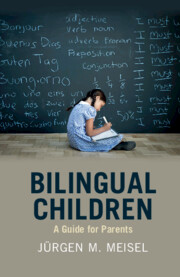Book contents
- Bilingual Children
- Bilingual Children
- Copyright page
- Dedication
- Contents
- Preface
- Abbreviations
- 1 Bilingualism in Early Childhood
- 2 How Infants Become Native Speakers
- 3 Two Languages in One Mind
- 4 Keeping Languages Apart
- 5 Language Dominance
- 6 Trilingual and More
- 7 The Age Question
- 8 Benefits and Advantages of Child Bilingualism
- Bibliography
- Index
- References
1 - Bilingualism in Early Childhood
Disentangling Myths and Facts
Published online by Cambridge University Press: 08 June 2019
- Bilingual Children
- Bilingual Children
- Copyright page
- Dedication
- Contents
- Preface
- Abbreviations
- 1 Bilingualism in Early Childhood
- 2 How Infants Become Native Speakers
- 3 Two Languages in One Mind
- 4 Keeping Languages Apart
- 5 Language Dominance
- 6 Trilingual and More
- 7 The Age Question
- 8 Benefits and Advantages of Child Bilingualism
- Bibliography
- Index
- References
Summary
More than half of the world’s population is bilingual. However, ‘bilingual’ can mean different things with respect to individuals’ linguistic competence, ranging from two native competences to basic communicative abilities. Uncertainties about the nature of the attainable linguistic knowledge in both languages leads to negative attitudes towards child bilingualism. Parents might therefore decide against bilingualism. This can contribute to the decline of minority languages. An example is Occitan. It is therefore crucial to disentangle facts and myths concerning risks and benefits of child bilingualism. Since these are well-studied issues, the search for facts can draw on resarch results that provide solid knowledge about the linguistic knowledge and skills of young bilinguals. The focus lies on the acquisition of grammatical knowledge and the ability to use it in communication. The goal is to provide information allowing parents to make informed choices when deciding on whether to raise children bilingually. All recommendations are based on research findings, some of which are summarized in the following chapters. These are organized in such a way as to allow readers to focus on the aspects that are most relevant to them.
Keywords
- Type
- Chapter
- Information
- Bilingual ChildrenA Parents' Guide, pp. 1 - 27Publisher: Cambridge University PressPrint publication year: 2019



